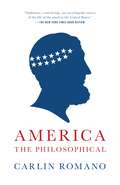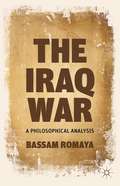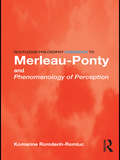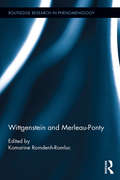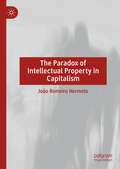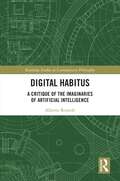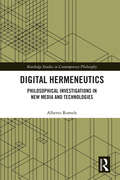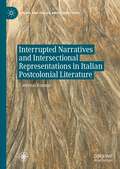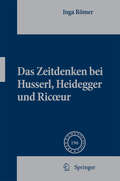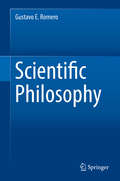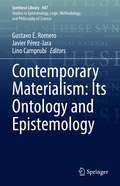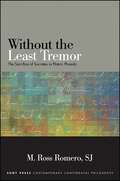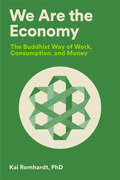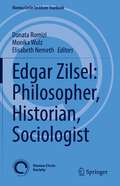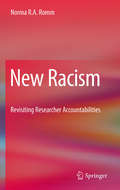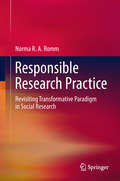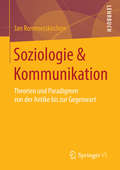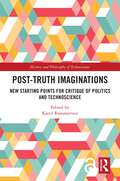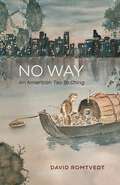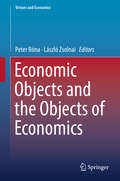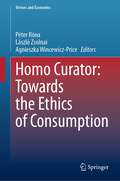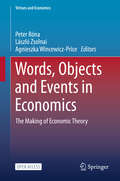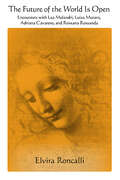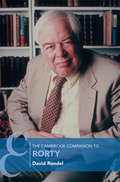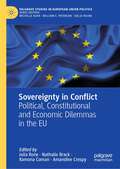- Table View
- List View
America the Philosophical
by Carlin RomanoA bold, insightful book that rejects the myth of America the Unphilosophical, arguing that America today towers as the most philosophical culture in the history of the world, an unprecedented marketplace of truth and argument that far surpasses ancient Greece or any other place one can name. With verve and keen intelligence, Carlin Romano--Pulitzer Prize finalist, award-winning book critic, and professor of philosophy--takes on the widely held belief that ours is an anti-intellectual society. Instead, while providing a richly reported overview of American thought, Romano argues that ordinary Americans see through phony philosophical justifications faster than anyone else, and that the best of our thinkers abandon artificial academic debates for fresh intellectual enterprises, such as cyberphilosophy. Along the way, Romano seeks to topple philosophy's most fiercely admired hero, Socrates, asserting that it is Isocrates, the nearly forgotten Greek philosopher who rejected certainty, whom Americans should honor as their intellectual ancestor. America the Philosophical introduces readers to a nation whose existence most still doubt: a dynamic, deeply stimulating network of people and places drawn together by shared excitement about ideas. From the annual conference of the American Philosophical Association, where scholars tack wiseguy notes addressed to Spinoza on a public bulletin board, to the eruption of philosophy blogs where participants discuss everything from pedagogy to the philosophy of science to the nature of agency and free will, Romano reveals a world where public debate and intellectual engagement never stop. And readers meet the men and women whose ideas have helped shape American life over the previous few centuries, from well-known historical figures like William James and Ralph Waldo Emerson, to modern cultural critics who deserve to be seen as thinkers (Kenneth Burke, Edward Said), to the iconoclastic African American, women, Native American, and gay mavericks (Cornel West, Susan Sontag, Anne Waters, Richard Mohr) who have broadened the boundaries of American philosophy. Smart and provocative, America the Philosophical is a rebellious tour de force that both celebrates our country's unparalleled intellectual energy and promises to bury some of our most hidebound cultural clichés.
The Iraq War
by Bassam RomayaThis book features a critique of key philosophical doctrines that dominate the Iraq war debate: just war theory, humanitarian intervention, democratic realism, and preventive war doctrine. The author evaluates each and develops a philosophical approach that offers a model for thinking through the philosophical dilemmas introduced by new wars.
Routledge Philosophy GuideBook to Merleau-Ponty and Phenomenology of Perception (Routledge Philosophy GuideBooks)
by Komarine Romdenh-RomlucMaurice Merleau-Ponty (1908 – 1961) is hailed as one of the key philosophers of the twentieth century. Phenomenology of Perception is his most famous and influential work, and an essential text for anyone seeking to understand phenomenology. In this GuideBook Komarine Romdenh-Romluc introduces and assesses: Merleau-Ponty’s life and the background to his philosophy the key themes and arguments of Phenomenology of Perception the continuing importance of Merleau-Ponty’s work to philosophy. Merleau-Ponty and Phenomenology of Perception is an ideal starting point for anyone coming to his great work for the first time. It is essential reading for students of Merleau-Ponty, phenomenology and related subjects in the Humanities and Social Sciences.
Wittgenstein and Merleau-Ponty (Routledge Research in Phenomenology)
by Komarine Romdenh-RomlucMaurice Merleau-Ponty and Ludwig Wittgenstein are two of the most important philosophers of the twentieth century, yet their work is generally regarded as standing in contrast to one another. However, as this outstanding collection demonstrates they both reject a Cartesian picture of the mind and sought to offer an alternative that does justice to the role played by bodily action, language, and our membership within a community that shares a way of life. This is the first collection to compare and contrast the work of these two major philosophers. Fundamental topics and problems discussed include the role of community in their philosophies; Merleau-Ponty on description and depiction and Wittgenstein on saying and doing; the role of language; their treatment of expression; their relation to the philosophy of the Vienna Circle; solipsism; and rule-following. It is essential reading for anyone studying the work of Wittgenstein and Merleau-Ponty, as well as those interested in phenomenology, philosophy of mind, and philosophy of language.
The Paradox of Intellectual Property in Capitalism
by João Romeiro HermetoThe Paradox of Intellectual Property in Capitalism is an innovative book that comprehensively discusses and analyses intellectual property under capitalistic social conditions and relations. It not only addresses some historical developments of intellectual property but also brings to the fore the very notion of what knowledge is, knowledge creation, and knowledge production and appropriation within a Marxist framework. Nonetheless, the adopted approach pays heed to multiple fields of knowledge, providing rich discussions that facilitate the understanding of actual social totality in which capitalism, knowledge production and appropriation, and the struggles of appropriation mutually reinforce each other, although not devoid of antagonisms and contradictions. In light of contemporary capitalism, the transformations that social property relations are undergoing must be scrutinised – such as those brought about by the development of digitalisation and the convergence between big pharma and tech giants. What are the conditions of intellectual property creation today? What theoretical assumptions does it make? Under what social relations is intellectual property produced? Throughout, the emphasis is not on individual cases or symptoms but on the overarching logic: the logic of capitalism as revealed in intellectual property.
Digital Habitus: A Critique of the Imaginaries of Artificial Intelligence (Routledge Studies in Contemporary Philosophy)
by Alberto RomeleThis book proposes a new theoretical framework for approaching the causes and effects that digital technologies and the imaginaries related to them have on the processes of self-interpretation and subjectivation. It formulates three main theses. First, it argues that today’s digital technologies, which are primarily based on artificial intelligence (AI) algorithms and big data are formidable habitus machines: they offer increasingly personalized services, but these machines are actually indifferent to individuals and their personalities. Second, this book contends that the effectiveness of these machines does not depend solely on their concrete capacity to classify the social world. It also depends on the expectations, hopes, fears, and imaginaries that we have concerning these technologies and their capacities. This cultural habitus—a worldview, or world picture—leads us to believe in the concrete effectiveness of AI and its potential for our societies. Third, the author takes this Bourdieusian notion of habitus and connects it to current “empirical turn” in philosophy of technology. He contends that, by looking too closely at the things themselves, many philosophers of technology have deprived themselves of the possibility to study the symbolic conditions of possibility in which single technological artifacts are always embedded. Digital Habitus will appeal to scholars and students working in philosophy of technology, the ethics of artificial intelligence, media studies, and science and technology studies.
Digital Hermeneutics: Philosophical Investigations in New Media and Technologies (Routledge Studies in Contemporary Philosophy)
by Alberto RomeleThis is the first monograph to develop a hermeneutic approach to the digital—as both a technological milieu and a cultural phenomenon. While philosophical in its orientation, the book covers a wide body of literature across science and technology studies, media studies, digital humanities, digital sociology, cognitive science, and the study of artificial intelligence. In the first part of the book, the author formulates an epistemological thesis according to which the “virtual never ended.” Although the frontiers between the real and the virtual are certainly more porous today, they still exist and endure. In the book’s second part, the author offers an ontological reflection on emerging digital technologies as “imaginative machines.” He introduces the concept of emagination, arguing that human schematizations are always externalized into technologies, and that human imagination has its analog in the digital dynamics of articulation between databases and algorithms. The author takes an ethical and political stance in the concluding chapter. He resorts to the notion of "digital habitus" for claiming that within the digital we are repeatedly being reconducted to an oversimplified image and understanding of ourselves. Digital Hermeneutics will be of interest to scholars across a wide range of disciplines, including those working on philosophy of technology, hermeneutics, science and technology studies, media studies, and the digital humanities.
Interrupted Narratives and Intersectional Representations in Italian Postcolonial Literature (Italian and Italian American Studies)
by Caterina RomeoThis book argues for the importance of adopting a postcolonial perspective in analysing contemporary Italian culture and literature. Originally published in Italian in 2018 as Riscrivere la nazione: La letteratura italiana postcoloniale, this new English translation brings to light the connections between the present, the colonial past and the great historical waves of international and intranational migration. By doing so, the book shows how a sense of Italian national identity emerged, at least in part, as the result of different migrations and why there is such a strong resistance in Italy to extending the privilege of italianità, or Italianness, to those who have arrived on Italian soil in recent years. Exploring over 100 texts written by migrant and second-generation writers, the book takes an intersectional approach to understanding gender and race in Italian identity. It connects these literary and cultural contexts to the Italian colonial past, while also looking outwards to a more diffuse postcolonial condition in Europe.
Das Zeitdenken bei Husserl, Heidegger und Ricoeur (Phaenomenologica #196)
by Inga RömerDie Studie untersucht das Zeitdenken bei Husserl, Heidegger und Ricoeur in philosophiehistorischer, systematischer und methodologischer Hinsicht. Im ersten Teil analysiert die Autorin Husserls Zeitdenken, im zweiten Teil führt sie eine Auseinandersetzung mit dem Zeitdenken Heideggers in frühen, aber auch späteren Schriften. Im dritten Teil wird das Zeitdenken Ricoeurs vorgestellt, mit einem besonderen Schwerpunkt auf seinen drei Aporien der Zeit. Die Autorin zeichnet zudem die Entwicklung der phänomenologischen Methode nach.
Scientific Philosophy
by Gustavo E. RomeroThis textbook presents the basics of philosophy that are necessary for the student and researcher in science in order to better understand scientific work. The approach is not historical but formative: tools for semantical analysis, ontology of science, epistemology, and scientific ethics are presented in a formal and direct way. The book has two parts: one with the general theory and a second part with application to some problems such as the interpretation of quantum mechanics, the nature of mathematics, and the ontology of spacetime. The book addresses questions such as "What is meaning?", "What is truth?", "What are truth criteria in science?", "What is a theory?", "What is a model?" "What is a datum?", "What is information?", "What does it mean to understand something?", "What is space?", "What is time?", "How are these concepts articulated in science?" "What are values?" "What are the limits of science?", and many more. The philosophical views presented are "scientific" in the sense that they are informed by current science, they are relevant for scientific research, and the method adopted uses the hypothetical-deductive approach that is characteristic of science. The results and conclusions, as any scientific conclusion, are open to revision in the light of future advances. Hence, this philosophical approach opposes to dogmatic philosophy. Supported by end-of-chapter summaries and a list of special symbols used, the material will be of interest for students and researchers in both science and philosophy. The second part will appeal to physicists and mathematicians.
Contemporary Materialism: Its Ontology and Epistemology (Synthese Library #447)
by Gustavo E. Romero Javier Pérez-Jara Lino CamprubíThis book provides an up-to-date revision of materialism’s central tenets, its main varieties, and the place of materialistic philosophy vis a vis scientific knowledge.Materialism has been the subject of extensive and rich controversies since Robert Boyle introduced the term for the first time in the 17th century. But what is materialism and what can it offer today? The term is usually defined as the worldview according to which everything real is material. Nevertheless, there is no philosophical consensus about whether the meaning of matter can be enlarged beyond the physical. As a consequence, materialism is often defined in stark exclusive and reductionist terms: whatever exists is either physical or ontologically reducible to it. This conception, if consistent, mutilates reality, excluding the ontological significance of political, economic, sociocultural, anthropological and psychological realities. Starting from a new history of materialism, the present book focuses on the central ontological and epistemological debates aroused by today’s leading materialist approaches, including some little known to an anglophone readership. The key concepts of matter, system, emergence, space and time, life, mind, and software are checked over and updated. Controversial issues such as the nature of mathematics and the place of reductionism are also discussed from different materialist approaches. As a result, materialism emerges as a powerful, indispensable scientifically-supported worldview with a surprising wealth of nuances and possibilities.
Without the Least Tremor: The Sacrifice of Socrates in Plato's Phaedo (SUNY series in Contemporary Continental Philosophy)
by M. Ross RomeroIn Without the Least Tremor, M. Ross Romero considers the death of Socrates as a sacrificial act rather than an execution, and analyzes the implications of such an understanding for the meaning of the Phaedo. Plato's recounting of Socrates's death fits many of the conventions of ancient Greek sacrificial ritual. Among these are the bath, the procession, Socrates's appearance as a bull, the libation, the offering of a rooster to Asclepius, the treatment of Socrates's body and corpse, and Phaedo's memorialization of Socrates. Yet in a powerful moment, Socrates's death deviates from a sacrifice as he drinks the pharmakon "without the least tremor." Developing the themes of suffering and wisdom as they connect to this scene, Romero demonstrates how the embodied Socrates is setting forth an eikôn of the death of the philosopher. Drawing on comparisons with tragedy and comedy, he argues that Socrates's death is more fittingly described as self-sacrifice than merely an execution or suicide. After considering the implications of these themes for the soul's immortality and its relationship to the body, the book concludes with an exploration of the place of sacrifice within ethical life.
We Are the Economy: The Buddhist Way of Work, Consumption, and Money
by Kai RomhardtA no-nonsense Zen approach to our economic realities can change everything and help us regain our freedom. Is it possible to be personally fulfilled, and also make a difference within our current financial system? If you're skeptical, business coach and Zen practitioner Kai Romhardt proposes a minimalist, awareness-based strategy that totally reconfigures our core economic relationships: work, consumption, and money.How do we do that? We need to pause, breathe, and get in touch with our true intentions. Too often, we think of the economy as something outside of us, as beyond the scope of our individual choices. We're unhappy with how things are going, with unthinking growth that polarizes our world and condenses wealth at the top, but we don't know what to do. Romhardt argues that individuals who wield a sharp Buddhist mindset can, in fact, create change through personal decisions: when we can see in to society, and in to our constructs, we become empowered to choose deeply real and purposeful lives.
Edgar Zilsel: Philosopher, Historian, Sociologist (Vienna Circle Institute Yearbook #27)
by Donata Romizi Monika Wulz Elisabeth NemethThis book provides a new all-round perspective on the life and work of Edgar Zilsel (1891-1944) as a philosopher, historian, and sociologist. He was close to the Vienna Circle and has been hitherto almost exclusively referred to in terms of the so-called “Zilsel thesis” on the origins of modern science. Much beyond this “thesis”, Zilsel’s brilliant work provides original insights on a broad number of topics, ranging from the philosophy of probability and statistics to the concept of “genius”, from the issues of scientific laws and theories to the sociological background of science and philosophy, and to the political analysis of the problems of his time. Praised by Herbert Feigl as an “outstanding brilliant mind”, Zilsel, being as a Social-Democrat of Jewish origins, mostly led a life of hardship marked by emigration and coming to a sudden and tragic end by suicide in 1944. The impossibility of an academic career has hindered the reception of Zilsel’s scientific work for a long time. This volume is a contribution to its late reception, providing new insights especially into his work during his years in Vienna; moreover, it shows the heuristic value of Zilsel’s ideas for future scholarly research – in philosophy, history, and sociology.
New Racism
by Norma RommThis book develops a debate around responsible social inquiry into new racism. A variety of ways of researching new forms of racism (for example, aversive, modern, cultural, purportedly color-blind, and new racism) are addressed. Experiments that have been undertaken to inquire into group identity and people's implicit bias in relation to those perceived as "other" are critically explored and their potential consequences reconsidered. The book also critically explores survey research, which, it is argued, can serve to reinforce the notion of the existence of ethnoracial groups with defined boundaries that inhere in social life. The book considers interviewing (including focus group interviewing) and case study research (including participant observation/ethnography) in terms of possibilities for moving beyond new forms of racism. Action research (defined by the understanding of an inextricable link between knowing and acting) is examined in-depth in terms of the hopes to "make a difference" at the moment of inquiry. Types of retroductive logic that are used to examine underlying structures that arguably unduly constrain people's life chances and render human relationships inhumane are also explored. The book draws together the different arguments; and it proposes ways in which the design of research into new racism can better approached as well as ways in which dialogue around processes of inquiry and the products thereof can be better fostered. Suggestions for nurturing humane social relationships that provide for transcultural meaning-making are threaded through the text.
Responsible Research Practice
by Norma Ra RommThis book explores ways in which creative research practice can be explicitly and mindfully geared to make a difference to the quality of social and ecological existence. It offers a range of examples of how different research methods can be employed (and re-tuned) with this intention. The book suggests that what Romm names "active" research involves using the research space responsibly to open up new avenues for thinking and acting on the part of those involved in the inquiry and wider stakeholders. The book includes a discussion of a range of epistemological, ontological, methodological and axiological positions (or paradigms) that can be embraced by inquirers implicitly or explicitly. It details the contours of an epistemology where knowing is recognized to be grounded in social relations, as a matter of ethics. While focusing on discussing the “transformative paradigm” and attendant view of research ethics, it considers to what extent the borders between paradigms can be treated as being permeable in creative and active inquiries. Apart from considering options for enhancing responsible research practice during the process of inquiry (and reconsidering mixed-research designs) the book also considers options for responsible theorizing that is inspirational for pursuing goals of social and ecological justice.
Soziologie & Kommunikation: Theorien und Paradigmen von der Antike bis zur Gegenwart
by Jan RommerskirchenDas Lehrbuch stellt die Entwicklung soziologischer und kommunikationstheoretischer Ansätze von der Antike bis zur Gegenwart vor. Die wichtigsten Theorien und Theoretiker werden im fachspezifischen und historischen Kontext vorgestellt und interdisziplinär behandelt: Platon und Aristoteles, Thomas Hobbes, Adam Smith und Immanuel Kant, Karl Marx und Max Weber sowie die Pragmatisten und die Systemtheorien von Talcott Parsons und Niklas Luhmann, aber auch George C. Homans und Ralf Dahrendorf sowie die neueren Ansätze von John Searle, Jürgen Habermas und Robert Brandom werden erläutert. Den Studierenden werden dadurch die Gemeinsamkeiten und Differenzen der wichtigsten klassischen und aktuellen soziologischen und kommunikationstheoretischen Ansätze vermittelt.
Post-Truth Imaginations: New Starting Points for Critique of Politics and Technoscience (History and Philosophy of Technoscience)
by Kjetil RommetveitThis book engages with post-truth as a problem of societal order and for scholarly analysis. It claims that post-truth discourse is more deeply entangled with main Western imaginations of knowledge societies than commonly recognised. Scholarly responses to post-truth have not fully addressed these entanglements, treating them either as something to be morally condemned or as accusations against which scholars have to defend themselves (for having somehow contributed to it). Aiming for wider problematisations, the authors of this book use post-truth to open scholarly and societal assumptions to critical scrutiny. Contributions are both conceptual and empirical, dealing with topics such as: the role of truth in public; deep penetrations of ICTs into main societal institutions; the politics of time in neoliberalism; shifting boundaries between fact – value, politics – science, nature – culture; and the importance of critique for public truth-telling. Case studies range from the politics of nuclear power and election meddling in the UK, over smart technologies and techno-regulation in Europe, to renewables in Australia. The book ends where the Corona story begins: as intensifications of Modernity’s complex dynamics, requiring new starting points for critique.
No Way: An American Tao Te Ching
by David RomtvedtDavid Romtvedt’s No Way: An American “Tao Te Ching” explores the art of living in the fast-paced, dangerous, unpredictable contemporary world. Lucid and wise in the spirit of its ancient Chinese predecessor, No Way functions as a kind of offbeat-yet-deadly-serious manual on the conduct of life. This slightly tongue-in-cheek take on the Tao’s advice acknowledges that nobody likes being told how to live, least of all the author himself. With an openness to complexity and mystery, in tones that range from cool to passionate, No Way brings the Tao into the social turmoil of a twenty-first-century United States beset by political strife, mass shootings, and financial greed. Romtvedt combats cynicism and malaise with wry verse that positions itself in the role of the trickster. The voice of these poems can be serious and contradictory yet also humorous and welcoming. By suggesting that the days of the ancient Tao are gone for good, No Way offers readers an invitation to guide themselves forward, free of sages and rulers.
Economic Objects and the Objects of Economics
by Peter Róna László ZsolnaiThis book examines the nature of economic objects that form the subject matter of economics, and studies how they resemble or differ from the objects studied by the natural sciences. It explores the question of whether economic objects created by modern economics sufficiently represent economic reality, and confronts the question whether tools, techniques and the methodology borrowed from the natural sciences are appropriate for the analysis of economic reality. It demonstrates the unsustainability of rational choice theory. It looks at economic agents, such as individuals, groups, legally constituted entities, algorithms, or robots, how they function and how they are represented in economics. The volume further examines the extent, if any, that mathematics can represent the objects of the economy, such as supply and demand, equilibrium, marginal utility, or the money supply as they actually occur in the economy, and as they are represented in economics. Finally, the volume explores whether the subject matter of economics – however defined – is the proper subject of theoretical knowledge, whether economics is an analytic or a descriptive discipline, or if it is more properly seen in the domain of practical reason. Specifically, the book looks at the importance and the ambiguity of the ontology of modern economics, temporality, reflexivity, the question of incommensurability, and their implications for economic policy.
Homo Curator: Towards the Ethics of Consumption (Virtues and Economics #8)
by Péter Róna László Zsolnai Agnieszka Wincewicz-PriceThis book explores the under-researched sources of the consumerist culture and the environmental damage it has brought about. The book is an outcome of the symposium on “The Ethics of Consumption” organised and hosted by the Las Casas Institute at the Blackfriars Hall, University of Oxford as part of its Economics as a Moral Science Programme. It takes on two contemporary problems: the human weakness and capacity for wrong-doing, and the failure of modern economic theory to account for the moral character of human behaviour and its implicit encouragement of gluttonous life-styles. In a time when grand political schemes are proposed to revive sustainability of global economy, the authors of the papers collected in this book highlight the need for moral renewal without which the most revolutionary structural reforms are bound to fail at producing the desired outcome. Topics of the book include the meaning and sources of avarice, the attempt to define what is enough, exploration of philosophical and theological perspectives which can serve as building blocks for the ethics of consumption. This makes the book of great interest to a broad readership of economists, social scientists and philosophers.
Words, Objects and Events in Economics: The Making of Economic Theory (Virtues and Economics #6)
by Peter Róna László Zsolnai Agnieszka Wincewicz-PriceThis open access book examines from a variety of perspectives the disappearance of moral content and ethical judgment from the models employed in the formulation of modern economic theory, and some of the papers contain important proposals about how moral judgment could be reintroduced in economic theory. The chapters collected in this volume result from the favorable reception of the first volume of the Virtues in Economics series and represent further contributions to the themes set out in that volume: (i) examining the philosophical and methodological fallacies of this turn in modern economic theory that the removal of the moral motivation of economic agents from modern economic theory has entailed; and (ii) proposing a return descriptive economics as the means with which the moral content of economic life could be restored in economic theory.This book is of interest to researchers and students of the methodology of economics, ethics, philosophers concerned with agency and economists who build economic models that rest in the intention of the agent.
The Future of the World Is Open: Encounters with Lea Melandri, Luisa Muraro, Adriana Cavarero, and Rossana Rossanda (SUNY series in Contemporary Italian Philosophy)
by Elvira RoncalliThe Future of the World Is Open examines the work and thought of three prominent Italian feminist philosophers, Lea Melandri, Luisa Muraro, and Adriana Cavarero, as it delves into the significant experiences that shaped them, highlighting their converging and diverging positions. Also appearing here for the first time in English translation are three essays by renowned author, journalist, and political figure Rossana Rossanda. Rossanda's essays offer a critical perspective on some of the contentious theoretical nodes with which Italian feminist thought has wrestled. Written in terse and engaging language, this book explores challenging philosophical and political questions, with themes including masculine domination; the body as the site of sedimented lived experience; sexual difference; the symbolic; the imaginary; feminine political authority; feminine subjectivity; and material humanism. A vivid picture of the socio-political context of Italian feminism emerges—illuminating its strong commitment to practice—and informing and enriching contemporary discussions at the intersection of different disciplinary perspectives.
The Cambridge Companion to Rorty (Cambridge Companions to Philosophy)
by David RondelThis Companion provides a systematic introductory overview of Richard Rorty's philosophy. With chapters from an interdisciplinary group of leading scholars, the volume addresses virtually every aspect of Rorty's thought, from his philosophical views on truth and representation and his youthful obsession with wild orchids to his ruminations on the contemporary American Left and his prescient warning about the election of Donald Trump. Other topics covered include his various assessments of classical American pragmatism, feminism, liberalism, religion, literature, and philosophy itself. Sympathetic in some cases, in others sharply critical, the essays will provide readers with a deep and illuminating portrait of Rorty's exciting brand of neopragmatism.
Sovereignty in Conflict: Political, Constitutional and Economic Dilemmas in the EU (Palgrave Studies in European Union Politics)
by Julia Rone Nathalie Brack Ramona Coman Amandine CrespyThis edited volume brings together leading international researchers in an attempt to disentangle and understand the multiple conflicts of sovereignty within the European polity in the aftermath of the 2008 economic crisis. While most research on sovereignty focuses on its international dimensions, what makes this volume distinctive is the focus on the mobilization of sovereignty discourses in national politics. Contrary to tired paradigms studying clashes between national and supranational sovereignty, the various chapters of the volume offer a provocation for the readers – what if these old vertical conflicts of sovereignty are increasingly complemented by horizontal conflicts between executives and parliaments at both the national and international level?
